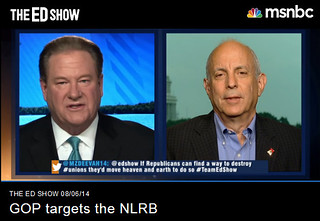Search News
For the Media
For media inquiries, call CWA Communications at 202-434-1168 or email comms@cwa-union.org. To read about CWA Members, Leadership or Industries, visit our About page.
CWA e-Newsletter: Aug. 7, 2014

Want to be in next week's CWA Newsletter? Send your stories and photos to blog@cwa-union.org or @CWANews. Follow the latest developments at www.resistancegrowing.org.
- Elections Matter
- Locked Out Kellogg Workers to Return to Work
- Judge Pressures Florida Lawmakers to Redraw Congressional Map
- Bargaining Update
- Black Lung Series Wins the Guild's Broun Award
- Seeds of Border 'Humanitarian Crisis' Sown in Trade Deals
- San Antonio Public Forum: How to Stop TPP's Attack on Texas' Jobs, Communities
- Public Workers Team Up in Texas
- Shared Services Agreements Make End Run Around FCC Rules
- AFL-CIO: U.S. Trade Policies Leave Working People, Communities Behind
- Movement Building Update
- Political Action Update
Elections Matter
MSNBC's Ed Schultz and CWA President Larry Cohen talk about Tennessee Republican Senator Lamar Alexander's plan to destroy the National Labor Relations Board. Alexander is the ranking member of the Senate Health, Education, Labor and Pension Committee and is in line to become chairman if Republicans gain control of the U.S. Senate.
Locked Out Kellogg Workers to Return to Work
After a nine-month-long illegal lockout, 225 workers will return to work Tuesday at Kellogg's cereal plant in Memphis, Tenn., where they make Frosted Flakes and Froot Loops.
Kellogg had attempted to shrink its skilled workforce and bring in lower paid, disposable workers – shutting out those who refused to accept the company's outrageous take-backs in the process. But the National Labor Relations Board (NLRB) filed a lawsuit against Kellogg seeking a temporary injunction. And last week Judge Samuel H. Mays Jr., of the Western District of Tennessee ordered Kellogg to end the lockout, reinstate workers, re-establish old employment conditions and bargain with the Bakery, Confectionery, Tobacco Workers and Grain Millers (BCTGM) in good faith.
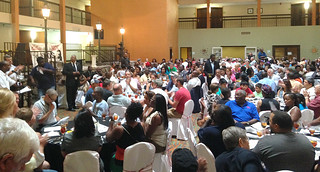
UCW-CWA activists attend BCTGM Local 252G's special meeting celebrating the end of the lockout. "BCTGM 252G has been one of the anchors with UCW-CWA, Workers Interfaith Network, the fast food workers and others of building the Memphis expression of the emerging Tennessee moral movement to 'Put the People First,'" said UCW-CWA's lead organizer Tom Smith. "So it's very exciting to see the movement we're building be a part of winning such an important victory."
"This decision validates what the BCTGM has contended all along in this lockout," said BCTGM President David B. Durkee. "Our members and their families have been subjected to more than 280 days of unnecessary pain and suffering at the hands of Kellogg. We applaud Judge Mays for beginning the process of righting this senseless tactic that was brutally imposed on these workers and their families. We look forward to our members returning to do what they do best – producing a quality product."
The lockout began on Oct. 22 when workers balked at the company's proposal for deep pay cuts, higher health insurance costs and more outsourcing, modifying the terms and conditions contained in the contract that runs through 2015.
Workers, who are members of BCTGM Local 252G, immediately lost their paychecks and health insurance. But, because thousands of activists rallied to confirm a full strength NLRB for the first time in a decade, the federal agency was empowered to charge Kellogg with multiple violations of federal law stemming from the lockout this past March.
Mays ultimately supported the NLRB and union, writing, "Kellogg effectively demanded changes to the wage rates of new or rehired regular employees. Those rates are set in the master agreement. The good-faith bargaining required by the (National Labor Relations) Act does not allow Kellogg to use creative semantics to force midterm changes in the wages of new or rehired regular employees in violation of the master agreement."
This isn't the end of the fight. More than 120 Kellogg employees have now signed formal complaints with the Equal Employment Opportunity Commission, claiming that the lockout was racially motivated.
And an administrative law judge has still yet to rule on the NLRB claims that Kellogg committed unfair labor practices. The case could potentially be appealed to the full board and eventually to federal appeals court. CWA President Larry Cohen will address delegates to the BCTGM 39th Constitutional Convention next week on fighting to secure our standard of living.
Judge Pressures Florida Lawmakers to Redraw Congressional Map
Judge Terry Lewis has ordered state legislators back into a special session to redraw the boundaries of two of Florida's 27 congressional districts that he ruled last month were invalid because they violated the Constitution.
The seats held by U.S. Reps. Corrine Brown, a Democrat from Jacksonville, and Dan Webster, a Republican from Winter Garden, were drawn to benefit Republicans and were in violation of the Fair District rules approved by voters in 2010, Judge Lewis wrote. Voters groups, including CWA, had challenged the congressional maps.
Judge Lewis asked state lawmakers to fix the district maps by August 15. He said he would decide then whether and when to hold special elections to fill those seats. The rulings brought howls of protests from Brown and Webster as well as members of the legislature. It is too late in the election season to be fiddling with the district maps, they argue, adding that absentee ballots have already gone out and a special election to fill those seats would end up hurting voters that Lewis wants to protect, including African Americans.
Judge Lewis said he sympathizes and even agrees with some of their arguments but the invalid districts could not be allowed to remain.
CWA District 3 Legislative-Political coordinator Donald LaRotonda said that despite Democrats having more registered voters in the state, they have ended up with fewer offices in elected statewide positions.
"Judge Lewis' ruling is a surprise, a pleasant one," LaRotonda said. "All the years that we worked on it, it just didn't seem like it would ever come to fruition."
He was talking about the Fair District law that voters approved but that Republicans effectively thwarted in schemes that Judge Lewis finally decided were a violation of the Constitution. Brown, for instance, ended up with a serpentine district stretching from Jacksonville to Orlando, which benefitted Republicans by packing African American voters along that stretch into one district.
It gave Brown a safe seat in Congress but made several other seats in the state safe for Republican candidates. Judge Lewis said districts could have been drawn to protect minority voters without dividing whole communities and packing Republicans into adjoining districts. Brown fought, unsuccessfully, to invalidate the Fair District law.
LaRotonda said Corinne Brown is a friend of labor and that the advocates want her in office but, to make other seats in the state more competitive, this has to be done.
Redrawing district lines no matter how bizarrely in order to create safe seats is not limited to Florida. In Pennsylvania, for instance, there are 1 million plus more registered Democrats than Republican – 4.1 million Democrats to 3 million Republicans – but Democrats have only five out of the state's 18 Congressional seats.
In Michigan about 40 percent of voters identify as Democrats and 33 percent as Republicans. Yet of the current Michigan members of Congress, nine are Republicans and five are Democrats.
Bargaining Update
CWA's Frontier Communications bargaining team reached a tentative four-year contract covering 1,500 members in West Virginia. CWAers engaged in a 13-month mobilization campaign to reach the tentative deal. Read more about the tentative agreement here. Information about ratification will be provided to members.

CWA Frontier members mobilize for a new contract.
And check out UnitedAtFrontier on Facebook.
###
A new tentative agreement for nearly 1,400 Spirit Airlines Flight Attendants, members of AFA-CWA, has been reached with the help of the National Mediation Board. Terms of the agreement were unanimously approved by AFA's Spirit Airlines leadership and will be sent to members for a ratification vote. The results will be announced immediately following the vote close on October 1.
The tentative agreement provides for economic improvements as well as protection of industry-leading healthcare and key quality of life provisions.
Black Lung Series Wins the Guild's Broun Award
A powerful series exposing a coal industry scheme to deny even meager benefits to miners suffering black lung disease has won the prestigious Heywood Broun Award, presented annually by The Newspaper Guild-CWA. The award for "Breathless and Burdened: Dying from Black Lung Disease, Buried by Law and Medicine" includes a $5,000 check that is shared by journalists from the Center for Public Integrity (CPI) and ABC News.
A pair of Sacramento Bee reporters and a trio of Washington Post journalists won the Broun Substantial Distinction winners. Each team of winners will receive $1,000.

Online report: 'Dying from Black Lung Disease, Buried by Law and Medicine.'
Chris Hamby of the Center for Public Integrity spent a year intensely researching the black lung issue and was joined by ABC's Brian Ross and Matthew Mosk in the investigation. Hamby's well-written online series and ABC's powerful broadcast reports quickly caused Johns Hopkins to suspend its compromised black lung program and spurred members of Congress to propose stronger legislative remedies.
"Black lung? Wasn't that something we first heard about decades ago and that public officials and the medical community have dealt with?" the four-member Broun judging panel wrote about choosing the series as the winner among nearly 70 standout entries from 2013.
"That was our belief – that is, until reading and viewing this report," the judges said. "Despite legislative reforms beginning in the late '60s and oversight by the Labor Department, it seems the coal industry giants have been gaming the system – not only using their hired legal specialists to prolong appeals in black lung benefit cases so that the process 'outlives' the victims, they actually co-opted one of our more prestigious hospitals to aid their scheme."
The Broun award honors the best of journalism in the tradition of the famed newspaper columnist who helped found the Newspaper Guild in 1933. The Guild will present winners with their awards in early October.
Read about other Broun award winners here.
Seeds of Border 'Humanitarian Crisis' Sown in Trade Deals
Editor's Note: In a ground-breaking series on the crisis, the Arizona Republic wrote profiles of some of the migrant youths, following their journey from Honduras, El Salvador and Guatemala through Mexico to the Rio Grande.
Journalists from the Los Angeles Times and Public Radio International have done stories about conditions in the overcrowded detention centers where the migrant youths and families are housed while they are being processed.
After treacherous, harrowing travel from Central American cities through the vast expanse of Mexico – braving human smugglers called coyotes or polleros and risking being robbed, beaten, raped, held for ransom or killed – the journey to hope for these Central American youths often ends in dank, overcrowded cells filled with uncertainty and despair.
And those are the lucky ones.
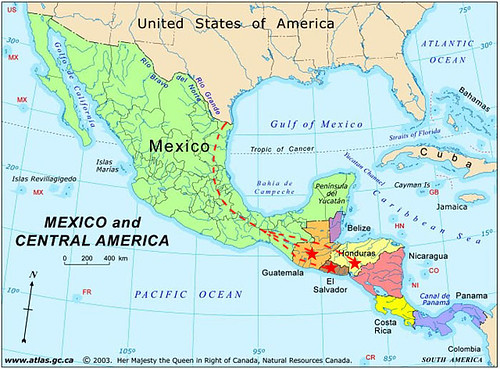
Central American migrant youths escaping crushing poverty and gang violence in Honduras, El Salvador and Guatemala travel 1,200 miles over harsh and dangerous terrain in Mexico to get to the Rio Grande Valley where they hope to surrender to American Border Patrol agents.
Often, the children arrive with only a small piece of paper with the name and address of a relative or family friend in the U.S. They are told by their mothers to find and turn themselves in to a uniformed border agent.
The tide of migrant youth and families fleeing poverty and gang violence in Central American cities in El Salvador, Guatemala and Honduras at the Texas Rio Grande has grown from a trickle a few years ago into a flood that President Barack Obama recently described as an "urgent humanitarian crisis."
But in the finger-pointing and shirking of responsibilities that have been the hallmark of those saying they want solutions, very few are acknowledging the role of U.S. policies and the effect of U.S. corporate involvement in those countries.
Our trade agreements with those nations, used by multinational corporate agricultural businesses to dump products into their markets, have so totally disrupted the region that many small family farms are abandoned as people are forced off lands and into cities where there are no jobs, no future and gangs roam and crime runs rampant. School children are being pressed into selling drugs or into prostitution by gangs. Defy them and risk death or someone making an example of your family.
Honduras has the highest murder rate in the world, and its neighbors Guatemala and El Salvador, are also among the highest. A recent United Nations High Commission for Refugees investigation found that no less than 58% of the Central American children interviewed were forcibly displaced because they suffered violence or faced threats that indicated a potential need for international protection.
The AFL-CIO Executive Board issued a statement stressing that the Obama administration has the authority under the U.S. Immigration and Nationality Act to designate these children as "refugees" and is urging the president to do so. The AFL-CIO strongly urged Obama not to send the children back to the dangers that they are escaping from.
The Rev. Richard Pates of the United States Conference of Catholic Bishops decried that all anyone wants to do in response to the crisis is to send in the U.S. Marines.
"While there is a role for security assistance, we also urge that an increased proportion of budgetary expenditures attributable to U.S. international aid be allocated to support the fostering of human rights, a just and humane civil society, and broad-based economic development," Rev. Pates wrote.
The problem is we have not learned our lessons from the effects of trade deals like the North American Free Trade Agreement (NAFTA) and the others, which created the environment that allowed the crisis to fester. American trade negotiators are hell bent on pushing through the disastrous Trans-Pacific Partnership agreement, a corporate power grab that seeks to do for the rest of the world what NAFTA and CAFTA and other such agreements have done for Central and North America.
San Antonio Public Forum: How to Stop TPP's Attack on Texas' Jobs, Communities
San Antonio — About 250 people – CWAers, environmental activists, students, and community groups – came together to figure out ways to convince their elected representatives to oppose the Trans-Pacific Partnership before the trade deal harms Texas industries and communities.
CWA members and allies across Texas also engaged in targeted social media actions last week, calling on their U.S. Representatives to stand up for good U.S. jobs and the ability of U.S. citizens to set our own laws. TPP, as currently negotiated, would allow multinational corporations to challenge U.S. laws and standards that they feel would cost them revenues.
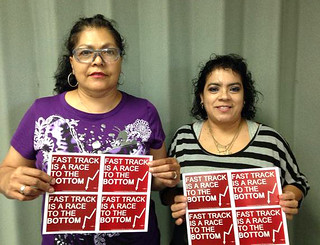
Members of IUE-CWA Local 86023 protest fast track and the Trans-Pacific Partnership trade deal.
Below: At the TPP forum in San Antonio, CWA President Larry Cohen answers questions about how TPP would hurt workers and communities. From left: Brooks Sunkett, CWA VP for Public, Healthcare and Education Workers; national commentator Jim Hightower; and Hal Suter, chair of the Lone Star Sierra Club.
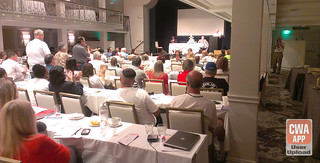
"Our 20 years of experience in trade deals, starting with the North American Free Trade Agreement, has proven that we lose far more jobs than we gain, and that our pay and benefits are pushed down, with global competition as the excuse," CWA President Larry Cohen said. "That's not the future we want for ourselves or our children. We must pursue economic and trade policies that are best for American workers – not multinational corporations."
Ten of the 12 Democratic members of the Texas delegation are on record opposing fast track and the TPP. The remaining two – Reps. Joaquin Castro and Henry Cuellar – haven't yet joined their colleagues in condemning the secrecy that has surrounded the TPP negotiations and the one-sided benefits being given to multinational corporations at the expense of U.S. workers' jobs and our country's ability to determine and carry out our own laws.
"What if our national leaders told us that communities across America had to eliminate such local programs as Buy Local, Buy American, Buy Green, etc., to allow foreign corporations to have the right to make the sale on any products purchased with our tax dollars? This nullification of our people's right to direct expenditures is just one of the horror stories in TPP," commentator Jim Hightower said.
Cohen, Hightower and Hal Suter, chair of the Lone Star Sierra Club, led the forum at the St. Anthony Hotel. District 6 Vice President District Claude Cummings, Jr., said the forum was a huge success, with great speakers and lively discussion by community and workers' leaders on how similar one-sided trade deals, like the North American Free Trade Agreement (NAFTA), have harmed U.S. workers and communities. Like NAFTA did, devaluing jobs that were then shipped overseas, TPP will send more jobs offshore, push down wages, devastate communities and allow multinational corporations to challenge our food safety and public health, consumer protections, environmental standards and other laws.
If approved, the deal would cover both manufacturing jobs and service sector jobs, including call center work and other Internet-related work.
Among the countries vying for this deal is Vietnam, where the average hourly wage is 75 cents and the minimum wage is 28 cents an hour. Vietnam also uses forced labor, with tens of thousands of workers in detention centers turning out products for exports, according to Australia Human Rights Watch, and indentured child labor. Brunei, another of the negotiating countries, is adopting new laws that institute "sharia" law in that country and violates human rights.
More than 153 House Democrats have taken a stand against "fast track" or Trade Promotion Authority for TPP. The "fast track" process would require that Congress vote yes or no on the entire trade deal, with no opportunity to make any amendments. "The United States cannot afford another trade agreement that repeats the mistakes of the past, and in fact, makes them worse. We can and must do better," these U.S. representatives wrote in a letter to President Obama.
Public Workers Team Up in Texas
The 2014 CWA Public, Healthcare & Education Workers Conference brought 110 activists from around the country to San Antonio for a weekend of organizing, movement building and rallying against bad trade deals.
CWA Public Worker, Healthcare and Education Workers Vice President Brooks Sunkett opened the three-day conference, which also included a community forum on the flawed Trans-Pacific Partnership trade deal (see previous story).
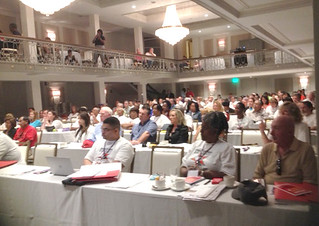
CWA's public, healthcare and education workers members meet in San Antonio. As part of the conference, participants joined in a TPP Forum with allies and community partners.
Sunkett talked about the continuing assault on public workers across the country, from challenges to workers' bargaining rights to attacks on public worker pensions and the privatization of important social services. He cited members of CWA Local 1040, who are working to stop the closing of facilities that assist the mentally challenged. "It's all about ideology, not cost," he said.
"It's good to be among brothers and sisters struggling the way you're struggling," said TSEU President Judy Lugo. "You're all fighting the same fight."
Speakers also included CWA D6 Vice President Claude Cummings, Texas Rep. Al Green, State Sen. Carlos Uresti, and State Sen. Leticia Van de Putte, the Democratic nominee for lieutenant governor.
Attendees listened to presentations on fighting privatization, public pension challenges and the significance of the Supreme Court's recent Harris v. Quinn decision.
Workshops focused on public sector organizing, messaging, team building and the Affordable Care Act. While sector-specific teach-ins targeted healthcare, higher education, public safety and state and local government.
Public workers were especially engaged on beating back the Trans-Pacific Partnership, a wide-ranging trade deal that threatens the livelihoods and wellbeing of working families. A public forum on the TPP featured CWA President Larry Cohen; Hal Suter, chairman of the Sierra Club's Lone Star chapter; Bob Cash, director of the Texas Fair Trade Coalition; and radio commentator and author Jim Hightower. And it wasn't a public worker-only crowd – environmentalists, call center workers, advocates of fair trade and members of coalition group Texas Forward all joined CWAers in learning more about how the agreement could jeopardize our jobs, health, environment and more.
Activists walked away from the forum with a stack of reading material – and a sense of urgency to raise awareness about this dangerous trade agreement. "We really need to educate our members on this and get them engaged and talking about it," said Lugo.
Shared Services Agreements Make End Run Around FCC Rules
In comments filed with the Federal Communications Commission, CWA called on FCC regulators to direct broadcasters to disclose all radio and television shared service agreements (SSAs).
SSAs are pervasive and damaging to the Commission's goals to promote localism, diversity, competition, and to prevent undue concentration of economic power in the media. Shared service agreements allow one TV station to provide station-related services – including programming services – to one or more other TV stations. "These mechanisms are used to evade the Commission's local television ownership rules and newspaper/broadcast cross-ownership rules," CWA said.
CWA, TNG-CWA and NABET-CWA filed the comments as part of the Quadrennial Regulatory Review of the Commission's Broadcast Ownership Rules.
"The Commission should immediately direct broadcasters to disclose all radio and television sharing agreements, by whatever name. Disclosure is long overdue," CWA said. That means that any kind of joint agreement, whether classified as a shared services agreement or other agreement, must be reported and monitored, CWA said.
Even without comprehensive data, it is clear that these shared service agreements destroy good jobs and affect diversity in programming. "In many cases, SSAs involve the complete shutdown of news on one station. In other cases, the same staff produced two highly similar newscasts," CWA said.
This is taking place in city after city. CWA's comments provided many examples, including the following:
- Tucson, AZ – Belo and Raycom established a "virtual triopoloy," with KSMB anchor Lou Raguse telling his viewers: "Raycom will produce this newscast on Fox 11 as well as a two-hour morning newscast. [I]t means that all the news, sports, engineering and production people here at Fox 11 are out of a job... "
- Syracuse, NY – Barrington Broadcasting (now Nexstar) took over operations of Granite Broadcasting's WTVH, creating a triopoly. As a result of the new shared services agreement, 40 workers at WTVH lost their jobs, including the entire news staff of on-air reporters, anchors, newswriters, producers, news photographers, editors and broadcast technicians. WTVH's former studios were put up for sale.
- Honolulu, HI – Raycom Media, which already owned and operated two stations, has swapped call-signs and network affiliations in its takeover of a third station, KFVE. (Raycom's alter ego, American Spirit, has applied to purchase KFVE outright.) Raycom now produced substantially identical newscasts for all three stations. Nearly 70 employees between the three stations have lost their jobs.
- Erie, PA – Lilly Broadcasting, which owns WSEE, took over operations of WICU, nominally licensed to SJL Broadcasting. In 2009, it merged all WSEE operations into WICU, eliminating all 35 off-air WSEE employees. Because the combined facilities lacked the capacity to simulcast, for at least four years, news programming on WSEE was prerecorded. This loss of immediacy created serious losses for viewers. For example, the 6 am newscast was pre-taped at 4 am, meaning that viewers could not hear current weather conditions.
CWA also reiterated its support for the Commission's longstanding rules as the best way to achieve its policy goals and called on the FCC to maintain the current rules governing local television ownership, local radio ownership, the newspaper/broadcast cross ownership ban, and dual network provisions.
AFL-CIO: U.S. Trade Policies Leave Working People, Communities Behind
The U.S. once "led the world in growing our middle class and creating the right conditions for inclusive economic growth. But beginning in the 1970s, the direction of U.S. trade, tax and global economic policy changed to policies that have concentrated wealth and political power in the hands of a few, gutted our manufacturing sector and left too many working people, their families and their communities behind," the AFL-CIO Executive Council said.
The AFL-CIO Executive Council challenged failed policies like the Trans-Pacific Partnership (TPP), the Trans-Atlantic Trade and Investment Partnership (TTIP), the Trade In Services Agreement (TISA) and the U.S.-China Bilateral Investment Treaty and pointed out that the evidence of U.S. trade policy failures is clear, from the latest record annual trade deficit with China ($318.4 billion in 2013) to a new proposal to classify American brand-name companies that offshore all of their production as "American manufacturers."
CWA President Larry Cohen outlined the "private corporate courts," or investor state dispute settlement process, that U.S. negotiators want to include in TPP and TTIP. These provisions would allow multinational corporations to challenge governments over public health, minimum wage, environmental regulations or other laws, raising the issue in a private tribunal that could then assess the citizens of the U.S. millions of dollars in penalties for disrupting the corporation's "anticipated profits."
And because these trade deals wouldn't get passed if ordinary citizens knew what was in them, they are negotiated in secret, with a "fast track" process that allows for no amendments by members of Congress.
It's time to change our outdated trade policies, the AFL-CIO said. That means instituting real transparency and consultation, with the goal of balanced trade and shared prosperity. "The status quo approach is unacceptable. Make no mistake – the labor movement will continue to oppose last century's NAFTA-model Fast Track and NAFTA-model trade agreements."
Movement Building Update
Sick of No Sick Days
A grassroots coalition delivered thousands of petitions to five city governments in New Jersey this week, kicking off a campaign to put earned paid sick leave on ballots in November.
If activists deliver enough signatures, voters in Irvington, Montclair, Passaic, Paterson, and Trenton will soon vote on local ordinances that would require employers to offer earned sick time. Newark and Jersey City already enacted earned sick days laws, which allow private-sector workers to earn one hour of paid sick time for every 30 hours they work. And on Monday, East Orange introduced legislation based on the Newark ordinance.
Coalition members include CWA, New Jersey Working Families, New Jersey Citizen Action, the New Jersey Time to Care Coalition, New Jersey Communities United and SEIU 32BJ.
"This is an unprecedented grassroots campaign to bring earned sick days laws to a diverse set of communities in New Jersey," said Dena Mottola Jaborska, Director of Organizing and Strategic Program Development, executive director of New Jersey Citizen Action and spokesperson for the statewide Time to Care Coalition. "It positions New Jersey as a leader in the fight for this common sense policy, and it builds unstoppable momentum for a statewide bill that will cover the 1.2 million New Jerseyans who can't earn a single sick day."
Support is strong. An overwhelming majority (83 percent) of state residents support earned sick days laws, according to a poll conducted by Rutgers' Center for Women and Work.
Political Action Update
CWA Local 1103 members are making the connection between how CWAers get good contracts and what happens in our elections.
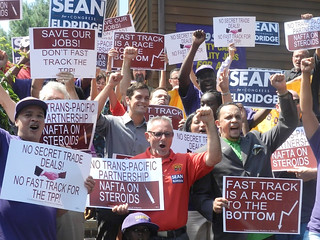
Members of CWA Locals 1103 and 1120, SEIU, Plumbers and Steamfitters Local 21, UFCW and the Hudson Valley Area Labor Federation protest the TPP trade deal and to support Sean Eldridge, candidate for Congress.
Below: Wendy Davis (center), candidate for Texas governor, meets with members of IUE-CWA Local 56782 at their union picnic this past weekend.
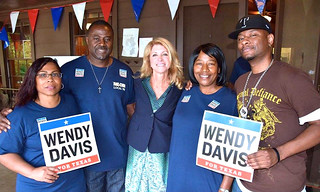
At a countdown-to-contract meeting, Verizon CWA activists talked about what was needed to change the state legislature to ensure that telecom measures that help protect good jobs can make it through the state Senate.
"Leadership of the NYS Senate will come down to one or two seats, with one of those seats located right here in our jurisdiction. We need to get involved in these elections if we want a fighting chance to pass legislation to protect our jobs," said Joe Mayhew, NYS legislative-political coordinator and Local 1103 secretary-treasurer. The local is asking members to contribute four hours of time during election season to help support pro-worker candidates and is holding Political Action Fund (PAF) drives at every work location.
